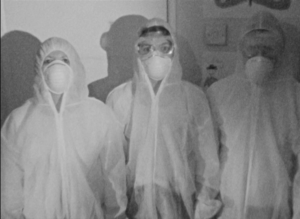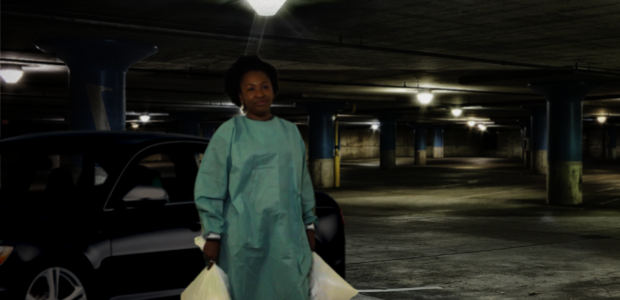
I wouldn’t wish medical trauma on my worst enemy. The anxiety that develops in the heart of being in and out of hospitals for any significant amount of time—or even just for a significant event—is difficult to shake and could even bleed into other, lesser medical institutions. As someone who spent most of their childhood in and out of hospitals and surgical procedures, I can sometimes barely stomach even so much as going to the dentist for a routine cleaning without first having the seeds of panic bloom inside me. In their own ways, each of the shorts in Final Girls Berlin Fest’s “Medical Horror” block speak to the unease of having to seek treatment, and of more or less growing up under the watchful, clinical eye of hospital staff.
The shorts on offer here almost follow a sort of natural progression. “Occupational Hazard”, written and directed by Ursula Ellis, kicks it off with a cautionary tale about one of the most dangerous and damaging jobs around: the mining industry. While trying to recover from a workplace injury and file the necessary paperwork, Diana (Virginia Newcomb) becomes so disoriented she begins to hallucinate. The combination of bodily injury and the noxious green fumes she was forced to inhale while underground have begun to mutate inside her, and soon she becomes dangerously unrecognizable. It’s a bit like if the Creepshow segment with Jordy Verrill were a cautionary tale. But it also speaks to the dangers inherent in some of our most demanding jobs. To enter into something like mining is to put every inch of yourself at risk, occasionally getting nothing for your trouble but internal damage and an early grave. In “Occupational Hazard”, it costs Diana everything before she even has a chance to try to gain it back.
“Freya”, written by and starring Rhona Rees and directed by Camille Hollett-French, is comparatively lighter fare, though no less devastating. Freya (voiced by Elysia Rotaru) is a health monitoring system and advanced descendant of such tools as Amazon’s Alexa and the Google Home voice-activated tech we use today. You can order anything with little more than a request and have every aspect of your physical and emotional welfare monitored. All it will cost you is a small implant. Jade (Rees), seeking to remedy a lonely night, hooks up with a stranger (also at the touch of a button, not altogether unlike today) and wakes the next morning to find her entire life changed. In a world where secrets are virtually impossible and bodily autonomy is continuously monitored, she must make a choice between acquiescing to societal demands or attempting to exercise freedom. Rees plays Jade with equal parts levity and gravitas, pulling viewers into her life effortlessly and making us feel every ounce of her struggle. “Freya” is a surprisingly powerful story of a world terrifyingly within reach and what happens to women’s autonomy when everyone and everything around them is—subtly or not—pushing them to increase the population, and the complex emotions that come along with unexpected pregnancy. Not to mention innumerable jabs at the delights and downfalls of having everything in the world at our fingertips.

As someone who spent a good deal of their life being poked, prodded, monitored, and measured by doctors for what sometimes felt like endless stretches of time, “They Called Me David” is both one of the most haunting and one of my favorite shorts of the entire festival. Written by Liam Dunn, directed by Lindsay Halllam and narrated by Millie Halllam as the voice of “David”, it’s an incredibly eerie and unsettling look into medical testing and confrontation with that which cannot ever fully be understood. David is only a child, yet they possess more power than any of the doctors know what to do with, and when they find themselves threatened by the power, the doctors lock David away. But power like that cannot be squashed, and all David wants is to find their father. It’s a bit difficult to articulate the impact and feel of “They Called Me David” but suffice to say it is one of the fest’s most atmospheric and unmissable offerings. It’ll break your heart and haunt you long after viewing, even if you can’t quite put your finger on why.
While we’re on the subject of medical professionals with no idea how to cope with the unknown, along comes writer-director Jenna Payne’s “Hysteria”. Shot in an “elevated stop motion” style during lockdown, it’s a short, sharp, darkly hilarious look into the battle faced by autoimmune patients every day of trying to convince your doctor there’s something the matter besides your living outside the general social expectations. Cassandra (Wendy Abraham) just wants a doctor to listen to and help her through her health concerns. The doctor she visits (Morgan Lariah) stares blankly while she speaks and credits her complaints to general dissatisfaction and not enough exercise. Frustrated with continually being ignored by a system put in place supposedly to help, Cassandra soon takes matters into her own hands. The longer I think on this one the more dark delight it brings me, from its apt title (remember, hysteria used to be a uniquely female but incomprehensible illness wherein our wombs simply wandered around our bodies, making us irrational on all sorts of levels) to the unfortunate seed of truth at the heart of the story. A unique kind of justice fantasy, “Hysteria” warns viewers to discredit and ignore the immunocompromised at your own risk, perhaps now more than ever.
Tags: Camille Hollett-French, Elysia Rotaru, Film Festivals, Final Girls Berlin, Final Girls Berlin Film Festival, Freya, Hysteria, Jenna Payne, Liam Dunn, Lindsay Hallam, Medical Horror, Medical Testing, Millie Hallam, Mining, Morgan Lariah, Occupational Hazard, Pregnancy, Rhona Rees, short films, shorts, They Called Me David, Ursula Ellis, Virginia Newcomb, Wendy Abraham



No Comments